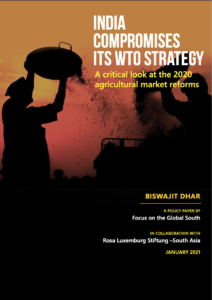01/02/2021
Under: India, Publications, Trade and Investment
Since the food crisis in the 1960s, India’s agricultural policy was designed to promote food security and protect rural livelihoods. From the mid-1990s, successive governments resisted neoliberal, export-oriented policies pushed by the World Trade Organization’s Agreement on Agriculture. Indian negotiators attempted to protect agriculture, even when other sectors were liberalised, keeping high import tariffs in place to protect farming communities.
Two new agricultural laws introduced by Prime Minister Narendra Modi in 2020 will change India’s agricultural policy completely by seeking to make India an agricultural export hub, linking farmers’ livelihoods to global trade as they have never been linked before.
How will India’s peasants and agricultural workers, who make up more than half of the workforce, withstand major disruptions caused by import competition and the attendant uncertainties of the global market?


![[IN PHOTOS] In Defense of Human Rights and Dignity Movement (iDEFEND) Mobilization on the fourth State of the Nation Address (SONA) of Ferdinand Marcos, Jr.](https://focusweb.org/wp-content/uploads/2025/07/1-150x150.jpg)



